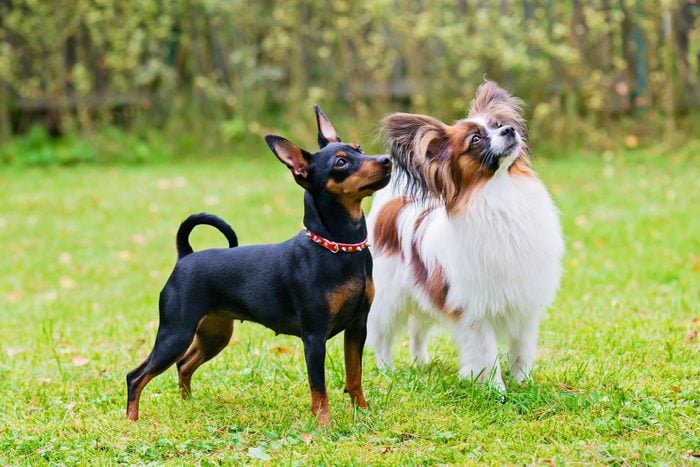German Shepherds are one of the most versatile and admired dog breeds globally. Renowned for their intelligence, loyalty, and courage, these dogs excel as family pets, working dogs, and protectors.
This comprehensive guide will walk you through everything you need to know about German Shepherds, helping you decide if this iconic breed is the right fit for your lifestyle.
Table of Contents
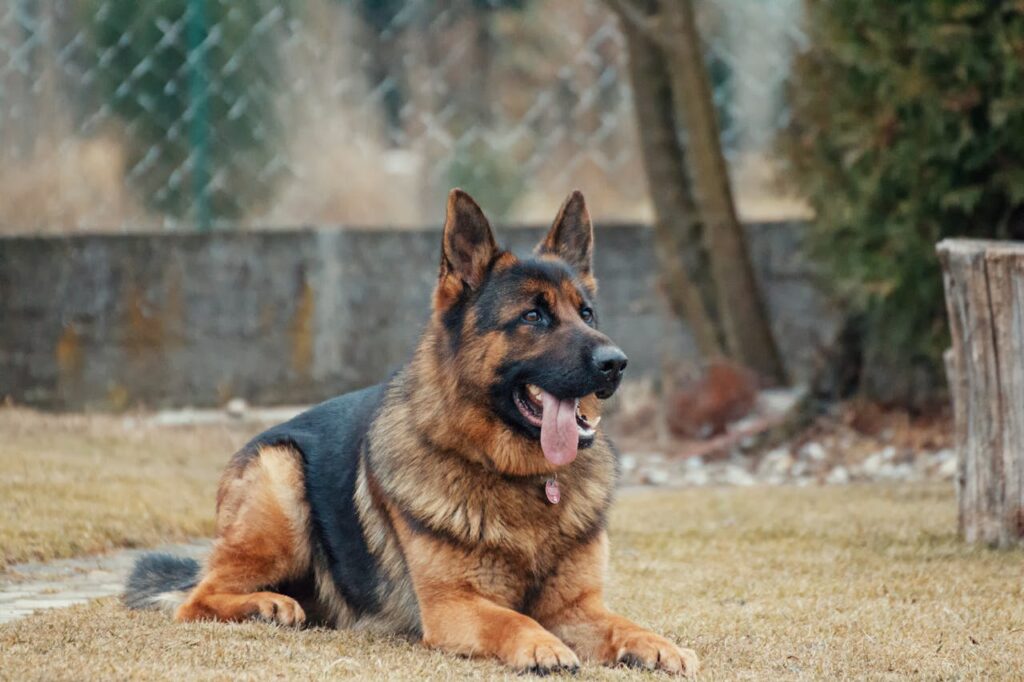
Introduction to German Shepherds
German Shepherds, also known as Alsatians in some regions, are medium to large-sized dogs with a muscular build and an elegant, wolf-like appearance. They are known for their high energy, sharp intelligence, and unwavering loyalty, making them a favorite for families and professionals alike.
Whether serving as a family protector, a search-and-rescue hero, or a service dog, German Shepherds leave an indelible impression with their remarkable abilities.
History and Origin of German Shepherds
German Shepherds originated in Germany in the late 19th century. Captain Max von Stephanite, the breed’s founder, aimed to create a working dog that exemplified intelligence, utility, and loyalty. By crossbreeding various herding dogs, he established the German Shepherd as we know it today.
The breed quickly gained recognition worldwide for its excellence in tracking, guarding, and herding. During World War I and II, German Shepherds were employed as messenger dogs, rescuers, and sentries, solidifying their reputation as highly capable working dogs.
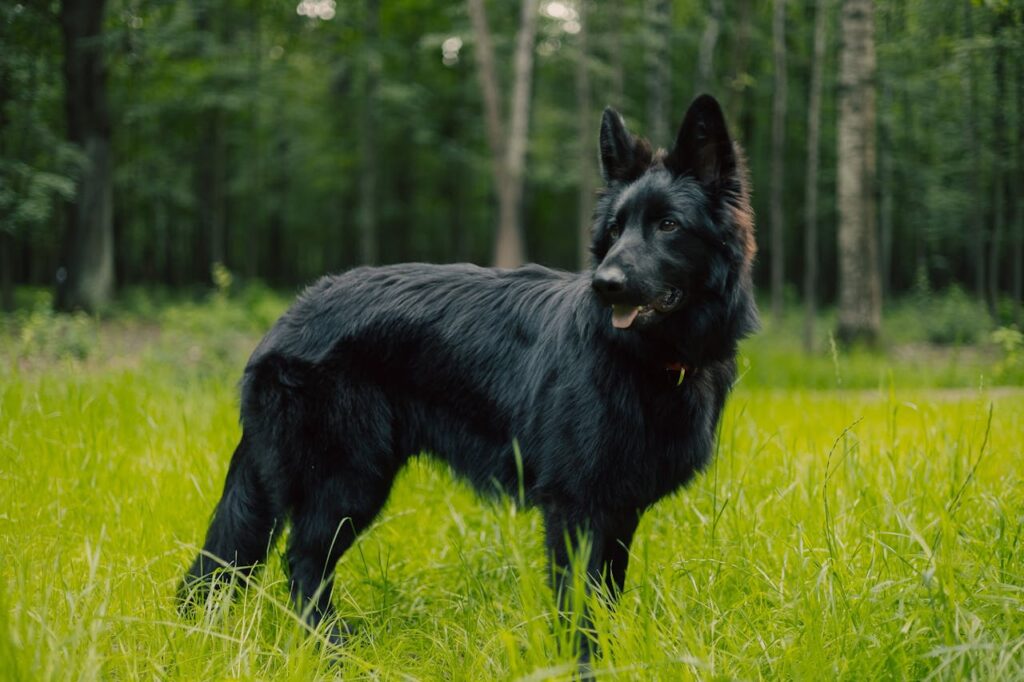
Why German Shepherds Were Created
Initially bred as herding dogs to assist shepherds in managing livestock, German Shepherds evolved into versatile working dogs.
Their intelligence, trainability, and strong work ethic made them ideal for roles in law enforcement, search and rescue, military operations, and as guide dogs for the visually impaired. In modern times, they have also excelled in dog sports, therapy roles, and even acting, showcasing their adaptability and diverse skill sets.
Physical Characteristics of German Shepherds
German Shepherds are large, athletic dogs with a double coat that can range from medium to long length. Their coat colors typically include black and tan, sable, or all-black. They have erect ears, a bushy tail, and an alert, confident expression.
Males generally weigh between 65-90 pounds, while females weigh 50-70 pounds. Their powerful build and agility enable them to excel in tasks requiring endurance, speed, and strength.
The iconic sloping back seen in some lines is a subject of debate among breeders, with some prioritizing working ability over conformation.
Temperament and Personality of German Shepherds
German Shepherds are loyal, confident, and courageous. They form deep bonds with their families and are protective by nature, making them excellent guard dogs. They are known to be gentle and affectionate with their loved ones while remaining alert and reserved with strangers.
With proper socialization, German Shepherds grow into well-rounded and adaptable companions. They thrive on being part of a household that includes them in daily activities and provides consistent guidance.

Bite Force and Jaw Strength
German Shepherds have a strong bite force of approximately 238 PSI, making them one of the breeds with the highest jaw strength.
This powerful bite, combined with their intelligence and training, is why they are often employed in security and law enforcement roles.
Despite their strength, a well-trained German Shepherd knows how to control its bite effectively, ensuring they pose no danger to their family or surroundings.
Choosing the Right German Shepherd Puppy
Selecting a German Shepherd puppy requires careful consideration and research. Begin by identifying a reputable breeder who conducts health screenings for common genetic issues such as hip dysplasia and degenerative myelopathy.
Look for breeders who prioritize temperament and socialization in their puppies.
Observe the puppies’ behavior during your visit. A good candidate will be curious, confident, and friendly without showing signs of aggression or excessive shyness.
Ask the breeder about the puppy’s lineage, vaccinations, and early socialization experiences. A clean, well-maintained environment is a good indicator of responsible breeding practices.
When choosing your puppy, consider your lifestyle and experience as a dog owner. German Shepherds are high-energy dogs that require active, dedicated owners. For more guidance on choosing your perfect puppy, check out our “Guide to Choosing Your Dream Puppy”.

Intelligence and Training
German Shepherds are among the most intelligent dog breeds, ranking third in canine intelligence. They are quick learners and thrive on training that challenges their mental and physical abilities.
Positive reinforcement techniques work best, and consistency is key to harnessing their full potential. Early training and socialization are essential to prevent undesirable behaviors. Training sessions should be varied and engaging to keep their interest.
Exercise and Energy Levels
German Shepherds are high-energy dogs that require ample exercise to stay healthy and happy. Daily activities such as long walks, jogging, agility training, or interactive play sessions are essential to meet their physical and mental needs.
Without sufficient stimulation, they may develop behavioral problems, including restlessness and destructive tendencies. Consider activities like obedience training or scent work to keep their minds sharp.
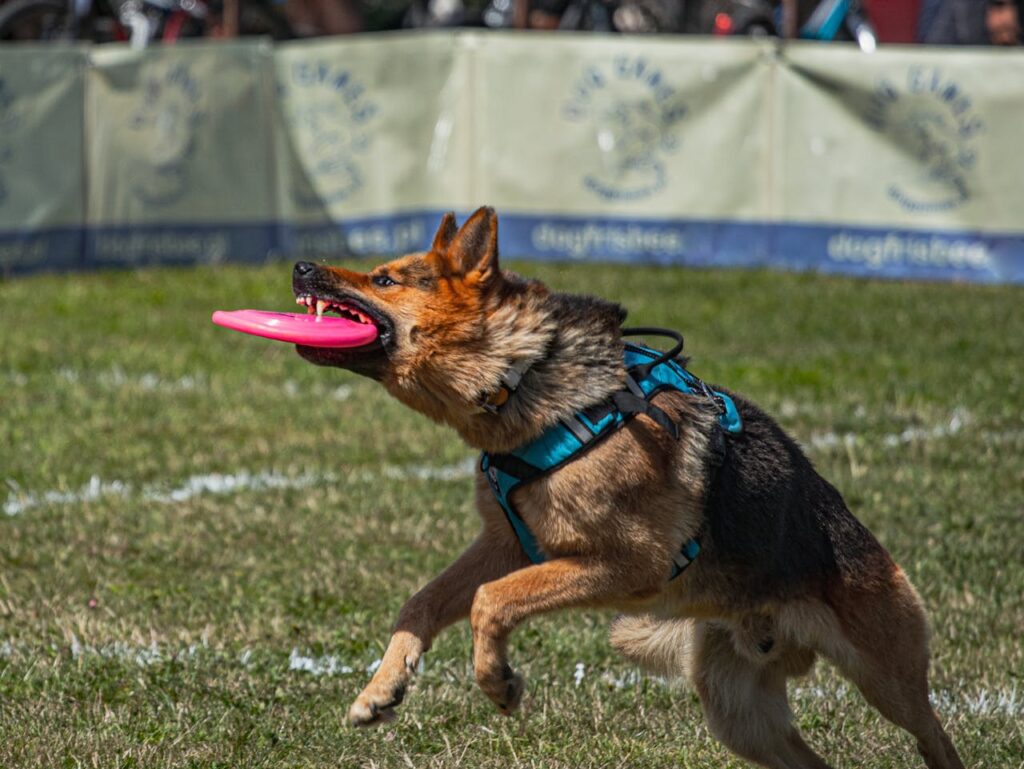
Diet and Nutrition
A balanced diet is critical for maintaining the health and vitality of German Shepherds. High-quality dog food, rich in protein and nutrients, is recommended. Include foods that support joint health, such as those containing glucosamine and chondroitin. Portion control is essential to prevent obesity, a common issue in large breeds.
Health and Lifespan
German Shepherds have a lifespan of 9-13 years. While generally healthy, they are prone to certain genetic and breed-specific health issues, including hip and elbow dysplasia, bloat, and degenerative myelopathy.
Regular veterinary check-ups, vaccinations, and a healthy lifestyle are vital for early detection and prevention of potential problems. Early socialization and training can also prevent behavioral health issues stemming from anxiety or fear.
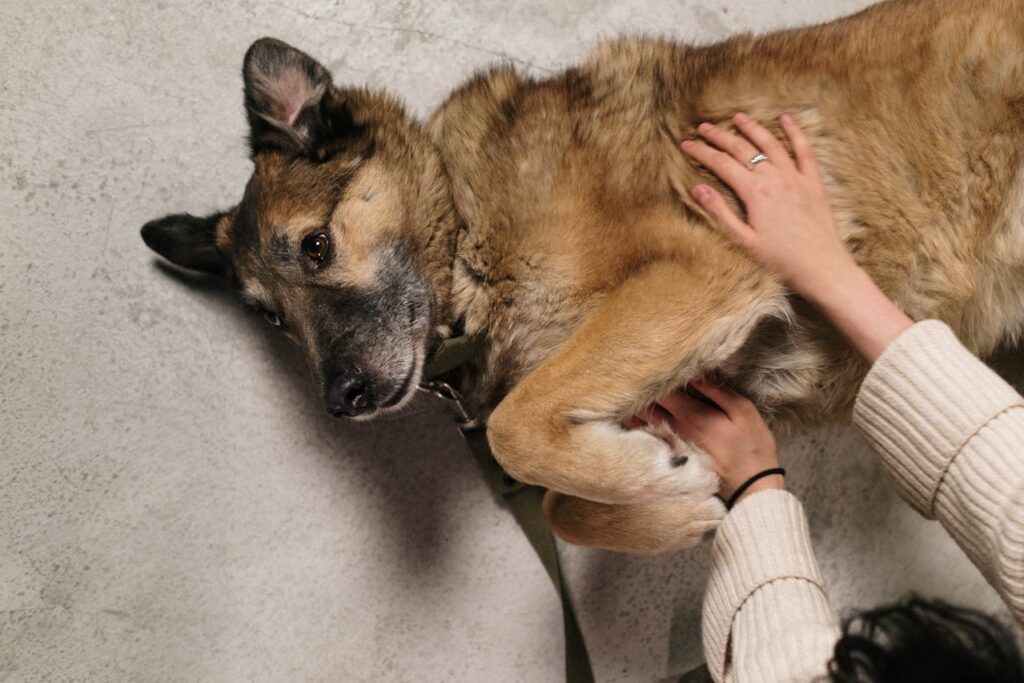
Grooming and Coat Care
German Shepherds have a double coat that requires regular grooming to manage shedding and maintain its condition. Weekly brushing helps reduce loose fur and keeps their coat healthy.
During shedding seasons (spring and fall), daily brushing is recommended. Occasional baths, nail trims, and ear cleaning are also part of their grooming routine. Investing in a high-quality vacuum cleaner can help manage the extra fur during shedding seasons.
Working Roles and Versatility
German Shepherds excel in various working roles due to their intelligence, loyalty, and physical prowess. They are employed as police and military dogs, search and rescue dogs, service animals, and even actors in movies and TV shows.
Their adaptability and eagerness to learn make them unparalleled in versatility. Stories of their heroism in dangerous missions continue to capture the admiration of dog lovers worldwide.
Fun Facts About German Shepherds
- German Shepherds are the second most popular dog breed in the United States.
- Rin Tin Tin, a famous German Shepherd, starred in many Hollywood films.
- They are known for their ability to learn complex tasks and commands quickly.
- German Shepherds have been part of space missions, including assisting astronauts in training scenarios.
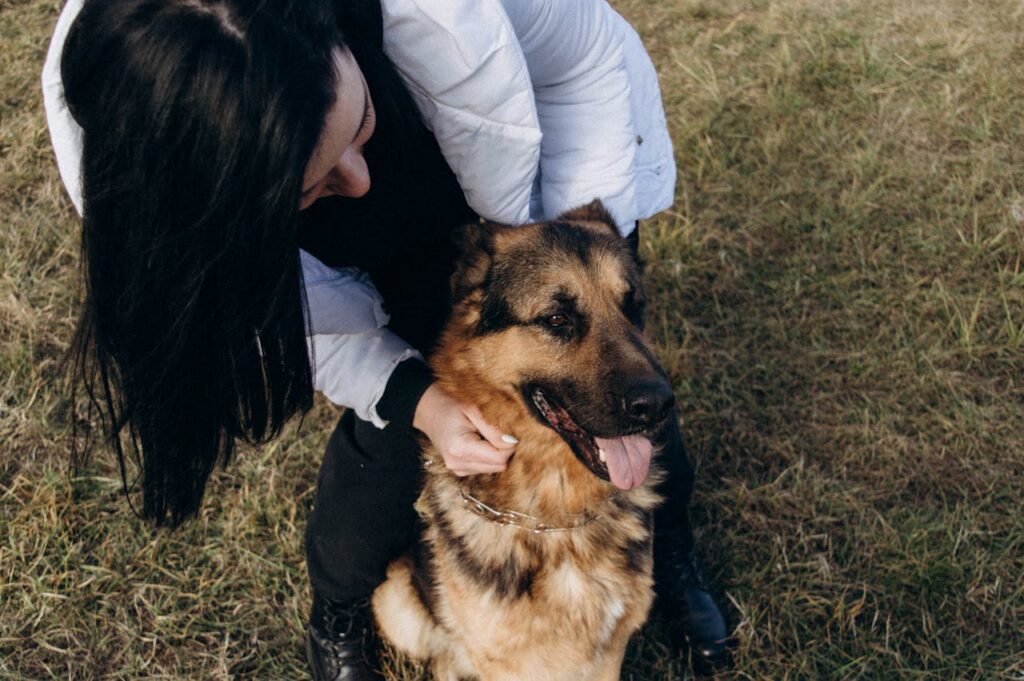
Challenges of Owning a German Shepherd
Owning a German Shepherd comes with responsibilities. Their high energy and intelligence require dedicated training and exercise. Without proper outlets for their energy, they may develop behavioral issues.
Additionally, their shedding can be intense, so be prepared for regular grooming and cleaning. They may also experience separation anxiety if left alone for extended periods.
Tips for Potential Owners
German Shepherds thrive in active households that can meet their physical and mental needs. They require a firm yet loving owner who can provide consistent training and socialization.
Potential owners should assess their ability to dedicate time, resources, and energy before committing. If you’re ready for the commitment, a German Shepherd will reward you with unmatched loyalty and companionship.
German Shepherd Puppies: What to Expect
German Shepherd puppies are adorable bundles of energy and curiosity. They require early training and socialization to develop into well-mannered adults. Be prepared for their teething phase, which can lead to chewing behaviors.
Providing appropriate chew toys and supervising them during play can help channel their energy constructively. Patience and consistency are key during this stage.

Breeding and Reproduction
Responsible breeding practices are essential to maintain the health and quality of the German Shepherd breed. Breeders should perform health screenings for hereditary conditions and prioritize temperament.
Prospective breeders must also ensure ethical practices to avoid overpopulation and poor health. Ensuring puppies are raised in a nurturing environment lays the foundation for well-adjusted adults.
Final Thoughts on German Shepherds
German Shepherds are loyal, intelligent, and versatile dogs that excel in various roles. Whether as a devoted family pet or a skilled working dog, they bring immense joy and utility to their owners.
If you’re considering this breed, be prepared to invest time and effort into their care and training.
For more insights into incredible dog breeds, check out our in-depth articles on Labrador Retrievers, French Bulldogs, and Golden Retriever another exceptional and beloved breed!
FAQs
What are the typical characteristics of German Shepherds?
German Shepherds are known for their intelligence, loyalty, and versatility. They excel in roles such as police work, search and rescue, and as service dogs due to their trainability and protective instincts.
How much exercise do German Shepherds need?
German Shepherds are an active breed that requires at least 1-2 hours of daily exercise. Activities can include walks, playtime, and mental stimulation like obedience training or interactive toys.
Are German Shepherds good with families and children?
Yes, German Shepherds can be excellent family pets when properly socialized and trained. They are protective and affectionate but require early training to ensure they get along well with children and other pets.
What are common health issues for German Shepherds?
Some common health concerns include hip and elbow dysplasia, degenerative myelopathy, and bloat. Regular vet check-ups, a balanced diet, and appropriate exercise can help prevent these issues.
How should German Shepherds be groomed?
German Shepherds have a double coat that sheds year-round, with heavy shedding during seasonal changes. Regular brushing, occasional baths, and routine nail trimming, ear cleaning, and dental care are essential for their grooming.


